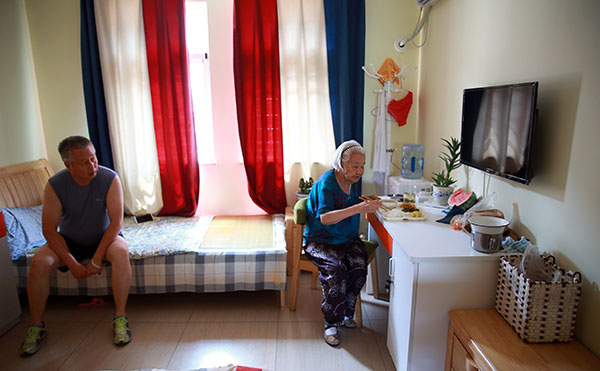Government plans insurance program for disabled seniors
Updated: 2016-08-08 09:24
By Shan Juan(China Daily)
|
|||||||||
 |
|
Xu Fengqin, a Puleyuan resident, eats lunch while being watched by her son, who pays regular visits.[Zou Hong/China Daily] |
Necessity, not choice
Yan Shuai, head of the Pule-yuan nursing home in south Beijing, said the matter is not one of choice, but necessity, and caring for disabled seniors is demanding and costly. "The monthly fee, from 5,500 to 8,000 yuan at Puleyuan, is a big burden on the elderly and their families," Yan said, adding that the fee for other patients is about half that for disabled seniors.
Demand is uncompromising and high. At present, disabled patients account for 30 percent of all Puleyuan's residents, and their illnesses range from dementia, cerebral hemorrhages, strokes and spinal injuries, according to Yan. "As long as people are bedridden, they are classified as disabled," he said.
Wang Lingfang, 68, is one such resident. She cannot swallow or speak and exists on a liquid diet administered via a feeding tube.
Wang has been bedridden for eight years, and Xi Xiulan, her long-term caregiver, said her meager pension of 2,600 yuan doesn't cover the monthly fee, so Wang is partly supported by her son, Liu Liangcai, a bus driver.
"I have my own family and child to support as well. We are struggling to make ends meet," said Liu, who earns about 5,000 yuan a month.
Yan, the nursing home head, said the pressure on people such as Liu could be alleviated by the introduction of long-term care insurance designed to cover a certain proportion of the cost of care.
Li Zhong, spokesman for the Ministry of Human Resources and Social Security, said the provision of care insurance is a matter of social development and stability.
The number of seniors is projected to rise to 400 million by 2035, and the proportion of disabled elderly is expected to rise substantially, Li said at a media briefing in February.
Yuan Xin, an expert in population studies at Nankai University in Tianjin, said the family has long shouldered the burden of caring for disabled seniors in China, but the continuous reduction of family size in the past three decades has made that model unsustainable.
The National Health and Family Planning Commission says the average 1950s household had 5.3 people, compared with 3.3 last year.
Today's Top News
Bank of England cuts rates to record low, restarts QE
Chinese tech to make Himalayan train possible
London unveils new anti-terror unit amid knife attack
Woman killed, five injured in London knife attack
Fury at Republican Party over Trump snub of Ryan
Ukraine's Savchenko on hunger strike
Chinese tourists robbed in France
5 feared dead as Russian helicopter shot down
Hot Topics
Lunar probe , China growth forecasts, Emission rules get tougher, China seen through 'colored lens', International board,
Editor's Picks

|

|

|

|

|

|







